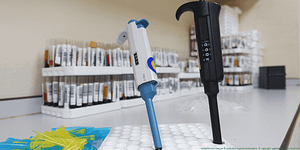“Don’t they use Blood for that?”
It’s a question many people ask when informed that we can use saliva to measure hormone levels. Well, you can however most GP’s prefer to test hormones in the traditional way. You do have a choice when it comes to collection method “type”, so before you head down to see the GP, you may wish to learn a little about your options.
This short post is an honest attempt to present unbiased arguments both for-and-against the use of both blood, and saliva, for testing hormone levels in Australia.
(Super quick disclaimer and away we go …)
TestoChecker® provides hormone testing kits using both saliva and serum specimen types. The purpose of our Blog is to provide clear and correct information which compliments our 5 Star service.
What are the Limitations of Blood for Testing for Hormones?

Is Blood testing hormone levels a good idea?
Blood hormone testing does not typically allow for the analysis of estrogen, androgen, and adrenal metabolites, which provide a wealth of data to assist the practitioner or user in understanding test results and forming a plan to fine-tune treatment.
Unless a person has been admitted as an inpatient, blood hormone testing usually involves seeing the local GP, who may issue a referral to a pathologist for a single blood draw. This will provide a single snap-shot of the hormone level at that particular time. The issue here is that androgen hormones like testosterone, cortisol and also precursor hormones androstenedione and DHEA are secreted in a pulsatile manner over the course of the day/night. Not knowing whether this level represents a crest, a valley, or somewhere in between means the result, whilst still of some value, is less so.
The obtain a Free Testosterone Result using serum involves additional steps, including the Vermeulen Equation.????
The hormones melatonin and cortisol are both examples of hormones operating on a daily cycle, and so not suited to the serum collection method. These hormones are “pulsatile” and it is this pulse or rhythm that is measured during day and night. It is far easier to spit into a collection vial throughout the course of the night/ morning, than would be to attend a blood collection centre.
What are the Limitations of Saliva for Testing Hormones?
All human biological specimen types have limitations and saliva is no exception. Let’s take a look at limitations of saliva for testing hormones specifically.
- A limited number of hormones can be tested using saliva
Only 10 or so hormones (see list further down) are tested this way when the human body secretes and circulates approximately 50 different hormones. Another weakness in the argument for use of saliva for testing hormones is the potential for blood spot contamination, or contamination related to toxic metals i.e. dental and oral fixtures. This has to be accepted as a possibility at both the saliva collection point and subsequent transfer to the lab.
- Luteinizing hormone cannot be reported using saliva
When testing hormones related to fertility, we would ideally like to see Luteinizing hormone reported and that isn’t possible at this stage using saliva. You need serum for testing the Luteinizing hormone and it involves additional steps, which is OK if our health care fund is covering the cost, or our GP is bulk billing the process.
- Contamination can occur when testing hormones using saliva
Contamination can occur by simply brushing teeth or drinking coffee prior to sample collection. Tobacco and also Vitamin B12 are known to interfere with melatonin test results making strict adherence to collection instructions important.
Fortunately, any good laboratory will evaluate the suitability of the saliva sample before the actual testing can commence. This is referred to as the ‘viscosity test’, and the saliva sample may be rejected should it fail. This test will not identify slight contamination though, only if the saliva sample is of sufficient quantity, and no degradation of the specimen has occurred during transportation.
Medicines can Interfere with Saliva Hormone Testing
Corticosteroids or glucocorticoids will obscure saliva hormnone test results making them worthless. The list below contains examples of medicines which are contraindicated to salivary hormnone testing.
Testing hormones while prescribed any of these is not advised.
- Deflazacort
- Dexamethasone
- Flucortolone
- Flunisolide
- Fluticasone
- Hydrocortisone
- Methylprednisolone
- Mometasone
- Prednisolone
- Prednisone
- Triamcinolone acetonide

Saliva hormone testing is known as ‘Functional Pathology’ in Australia.
Hormone Saliva Testing in Lower Concentrations
That saliva has many diagnostic uses in a variety of clinical settings in not disputed. The highly sensitive modern test methods now match the convenience and ease in terms of appeal. Despite being in very low concentrations, a large variety of substances can nowadays be analysed using saliva. That does’t mean saliva is a better specimen type, but is superior in specific applications only.
Industry Accreditation Favours the Big Labs
Hormone tests are sometimes combined by laboratory’s to make larger multi-hormone tests. Some of these test configurations have been scrutinized for both benefit and efficacy (value to the user) by either a national or international (or both) global regulatory authority. The cost of having an individual test or an entire laboratory accredited is excessive and so favours the larger commercial labs with their deep pockets.
The awarding of that accreditation takes time, and demonstrates a commitment to excellence on the part of the laboratory itself. In cases where it is a specific test being accredited, practitioners have increased confidence in the [value of the] test results.
Which Hormones can be Reliably Tested Using Saliva
Below is the short list of individual hormones routinely tested using saliva by the larger laboratories. Caution is advised in cases where a practitioner offers a person saliva testing for a hormone that isn’t on this list:
- Testosterone
- Cortisol
- Melatonin
- Androstenedione
- Progesterone
- Estrone [E1]
- Estriol [E3]
- Estradiol [E2]
- DHEAs
Brief Summary
There is no clear winner here. Knowing which method is the right method for our needs is the key piece of advice I hope you take with you. In terms of number of applications, Serum takes the Crown. However saliva (as a testing specimen type) has demonstrated a clear advantage with regard to oral health, sex hormone testing and tracking, or the early detection of cystic fibrosis, Sjögren’s syndrome or adrenal cortex related disease.
I hope ‘Limitations of Serum & Saliva for Testing Hormones’ was of some use to you.
Stay safe.
Author: G. Saywell [Testochecker employee]
TestoChecker® Hormone Test Kits Phone: +61293271336 Address: L 13 465 Victoria Ave, Chatswood, NSW, 2067 Purpose: We Take the Stress out of The Test!
Sources include: pubmed-diagnostic uses of saliva
You may also like:


